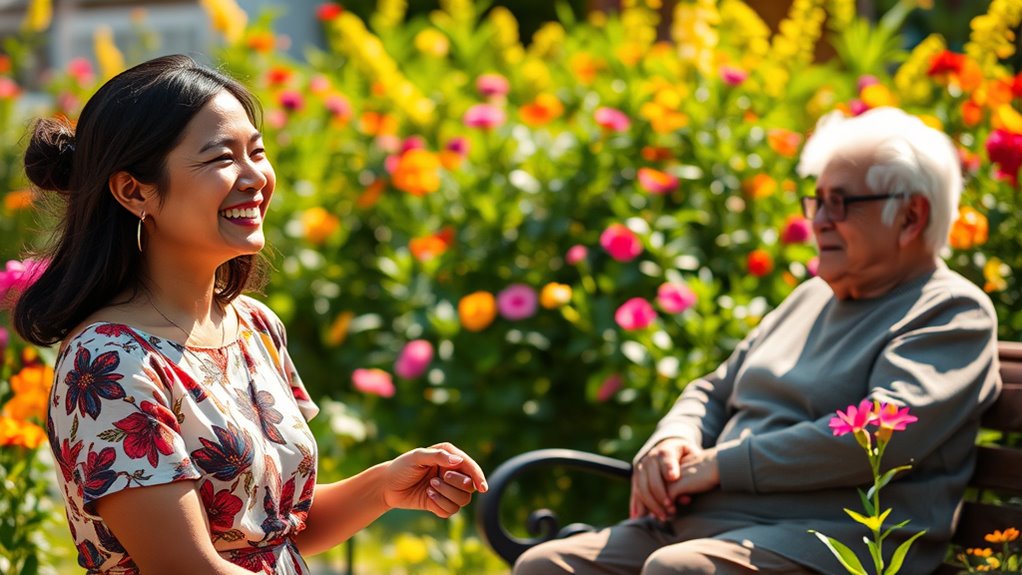Filipina women appreciate partners who respect elders because it reflects deep cultural values and emotional maturity. In Filipino culture, honoring elders strengthens family ties and highlights your responsibility and kindness. Actions like the “mano po” gesture show your understanding of their wisdom and experiences, enhancing relationship connections. This respect not only positively impacts your dynamics but also leads to greater relationship satisfaction. Learn how such values can further enrich your partnerships and create lasting bonds.
Key Takeaways
- Filipina women value partners who respect elders, reflecting shared cultural values of filial piety and family responsibilities.
- Respectful behavior towards elders signals emotional maturity and stability, traits that are highly attractive in potential partners.
- Demonstrating kindness to elders fosters deeper connections and aligns with the importance of intergenerational relationships in Filipino culture.
- A partner’s respect for elders enhances relationship satisfaction and supports effective communication, creating a positive dynamic in romantic partnerships.
- Filial respect not only enriches personal relationships but also strengthens family ties, promoting a sense of belonging and cultural legacy.
The Cultural Importance of Elder Respect in the Philippines
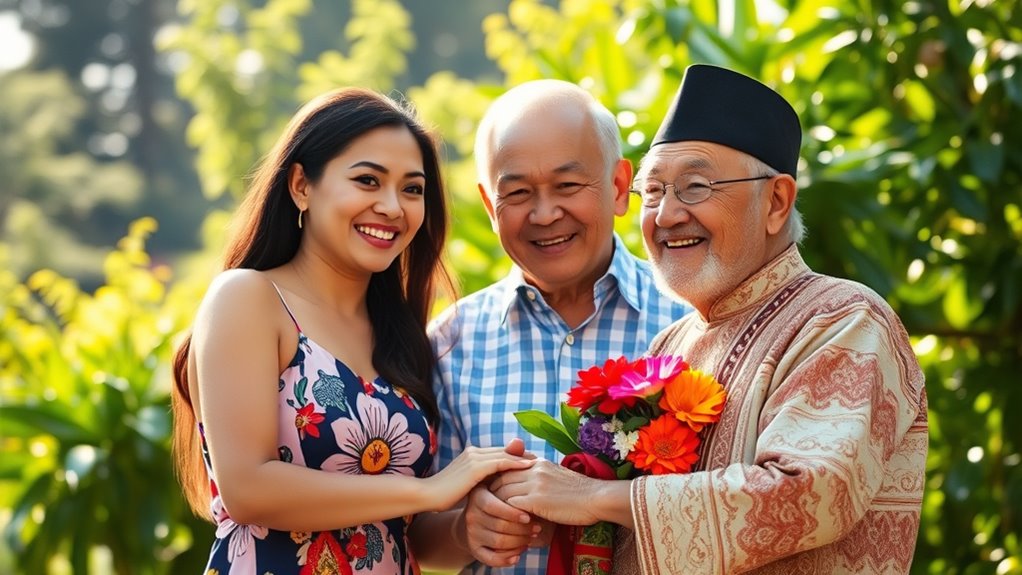
In the Philippines, respecting elders isn’t just a cultural norm; it’s a deeply ingrained value that shapes family dynamics and community interactions.
Family ties are central, with strong responsibilities toward elderly members. Influenced by both Eastern and Western customs, this respect fosters positive intergenerational relationships, allowing wisdom to flow through families. Elders are often consulted in decision-making, reflecting their valued experience.
Caring for aging parents is seen as a sacred duty, reinforced through cultural rituals and celebrations like Elderly Filipino Week. This respect enhances family unity and emotional support, ensuring that younger generations actively participate in elder care.
The “Mano Po” Gesture: A Symbol of Deference

The “mano po” gesture is a beautiful expression of respect that Filipinos practice to honor their elders. When you take an elder’s hand and gently press it to your forehead, you’re not just showing deference; you’re acknowledging their wisdom and life experiences.
This meaningful act, often accompanied by the phrase “mano po,” is typically performed with your right hand. You’ll usually do this when entering an elder’s home or meeting them for the first time.
Elders often respond with blessings, deepening the bond between generations. By practicing “mano po,” you strengthen cultural values that emphasize family loyalty and respect, ensuring these traditions are passed down to future generations.
Elders as Sources of Wisdom and Guidance
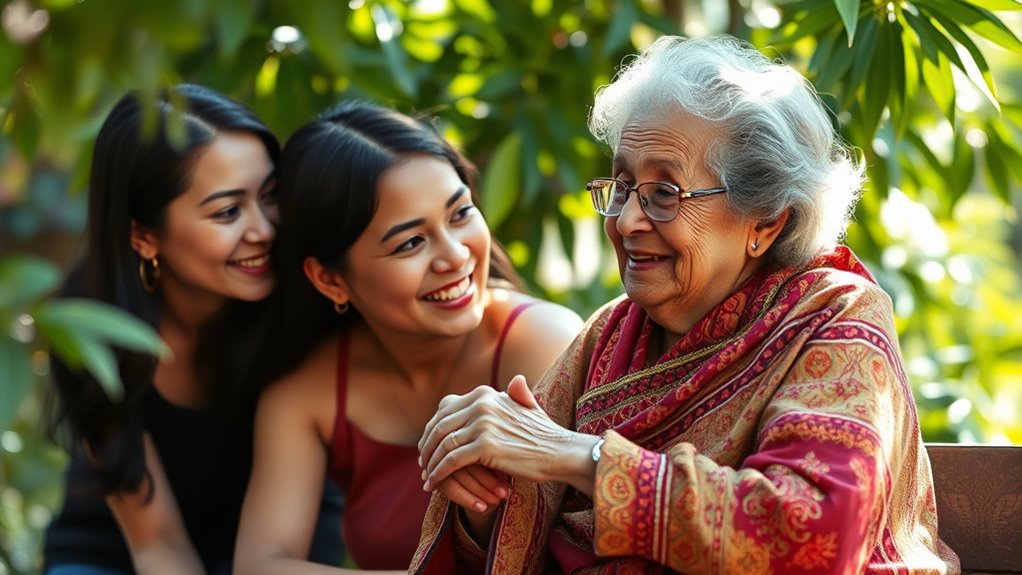
While you might often seek advice from friends or peers, it’s the elders in your life who hold a treasure trove of wisdom and guidance. Their extensive life experiences allow them to serve as role models, offering valuable insights on maneuvering challenges.
Elders are revered for their deep knowledge of cultural traditions and values, ensuring these are passed down through generations. They often step in as mediators, helping to resolve conflicts with impartiality.
Family Values and the Role of Elders
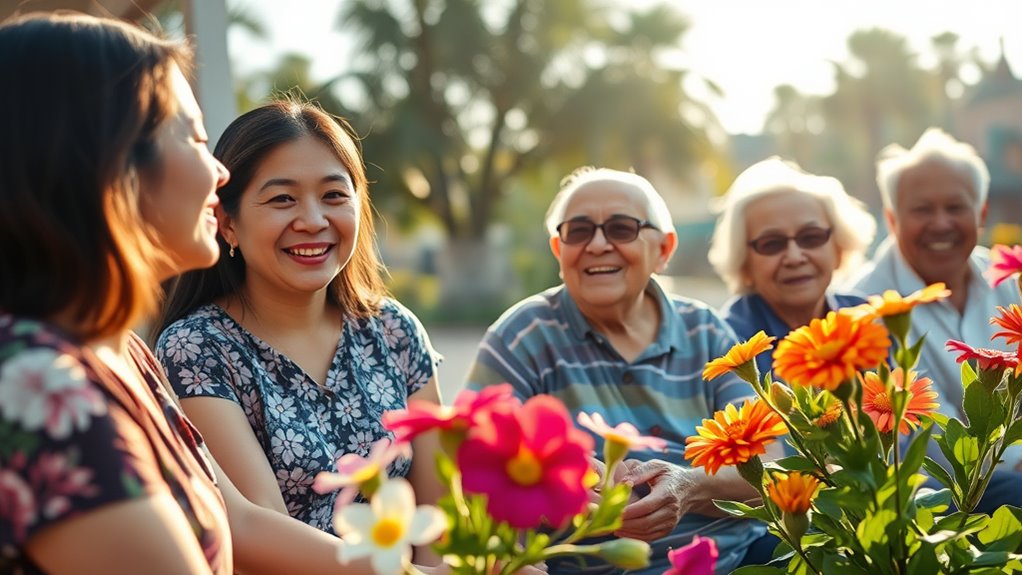
Respecting elders isn’t just a cultural expectation in Filipino families; it’s a cornerstone of family values that strengthens bonds and fosters unity. When you honor your elders, you’re embracing their wisdom and guidance, which enriches your family dynamic.
Traditional gestures like *mano po* reflect this respect, creating a connection that roots you in your heritage. You learn to communicate respectfully, using terms like “po” and “opo,” reinforcing your family ties.
As you grow, you’ll naturally take on responsibilities for aging parents, showcasing your commitment to intergenerational support. Elders play essential roles in community events, ensuring that traditions and values are passed down.
This mutual respect cultivates a harmonious environment where everyone thrives together.
Strengthening Community Bonds Through Respect
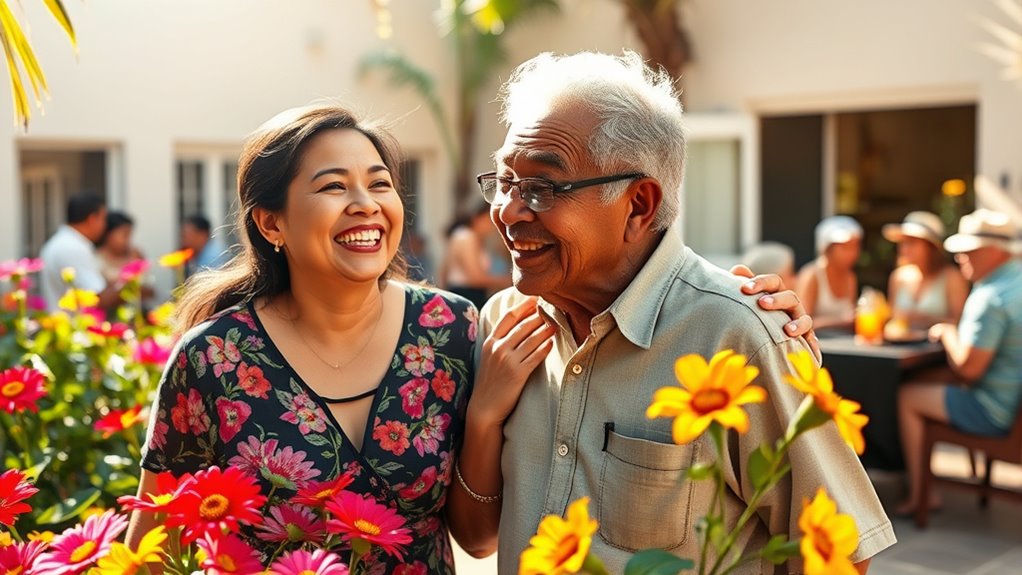
Honor for elders not only strengthens family ties but also plays a vital role in building community bonds. In Filipino culture, respect for elders is a deep-rooted norm that fosters unity within neighborhoods.
Gestures like *pagmamano* symbolize this respect, maintaining harmony among community members. Elders guide decisions and nurture leadership styles that highlight mutual respect, fundamental for intergenerational relationships.
Community events celebrating elders reinforce cultural values and encourage shared wisdom, which enhances decision-making processes. By educating younger generations on the importance of honoring elders, communities guarantee cohesion and continuity of cultural traditions. Supporting elder members reflects a collective responsibility, strengthening relationships and promoting a sense of belonging within the community. Respect for elders truly enriches the fabric of community life. Additionally, as seen in the rise of new Bitcoin holders, the community’s strength can also lead to innovative approaches in various fields.
Partner Preferences: The Impact of Elder Respect
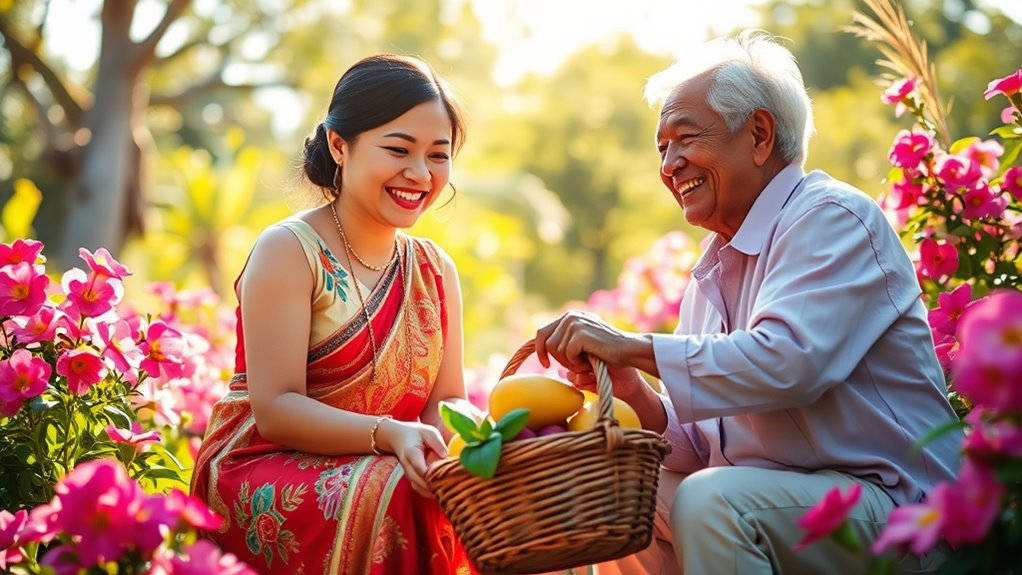
Understanding the significance of respecting elders can greatly influence partner preferences among Filipina women. When you show respect for elders, it signals cultural alignment and emotional maturity, making you more desirable.
This trait not only appeals to their values but also enhances family acceptance, which is vital in Filipino culture. Filipina women often prioritize partners who demonstrate this respect, viewing it as a sign of reliability and trustworthiness.
Additionally, respecting elders strengthens bonds and promotes social harmony within families. By embodying these values, you’re likely to gain social approval within their communities, reinforcing your potential for a long-term relationship.
Ultimately, respect for elders becomes a cornerstone of a fulfilling partnership.
Family Dynamics and Responsibilities Towards Elders
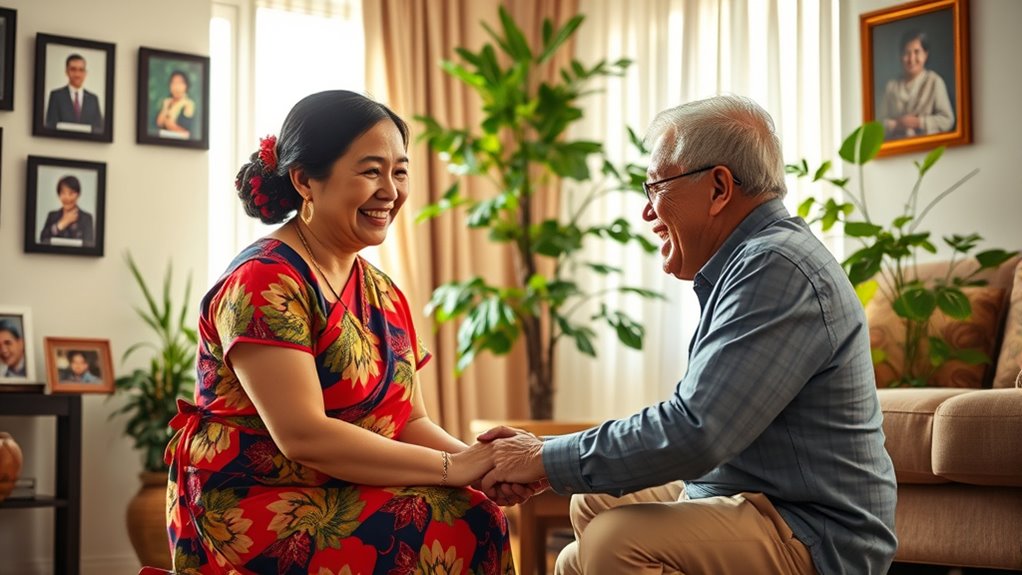
While maneuvering family dynamics in Filipino culture, you’ll quickly notice the pivotal role elders play within the household. Elders hold authority, providing wisdom and guidance, which shapes decision-making processes.
The traditional hierarchical structure emphasizes respect and responsibility towards aging parents, reinforcing the importance of filial piety. As a child, you’re expected to care for your elders, ensuring their welfare and support.
This cultural expectation extends to the entire family, with extended relatives often involved in elder care. However, modern challenges like societal pressures and declining traditional values can strain these relationships.
You’ll find that maintaining strong intergenerational bonds is essential for preserving the family’s unity and ensuring elders receive the respect and care they deserve. Additionally, understanding filial responsibility laws can guide families in navigating their obligations towards elder care.
Attractiveness of Respectful Behavior in Potential Partners

Respect for elders can greatly enhance a person’s attractiveness as a potential partner, especially in cultures that prioritize family values. When you display kindness and respect, you signal emotional support and create a sense of security in your relationships.
This behavior aligns with cultural norms, making you more appealing in the eyes of others. Respectful actions often lead to social approval, enhancing your attractiveness through the “halo effect.”
You also demonstrate moral integrity, suggesting strong character and emotional stability—traits that are highly desirable. By embodying shared values and social skills, you foster deeper connections, making you a more attractive partner.
Ultimately, respectful behavior reflects your authenticity, boosting your overall appeal in romantic pursuits.
Cultural Traditions Passed Down Through Elders
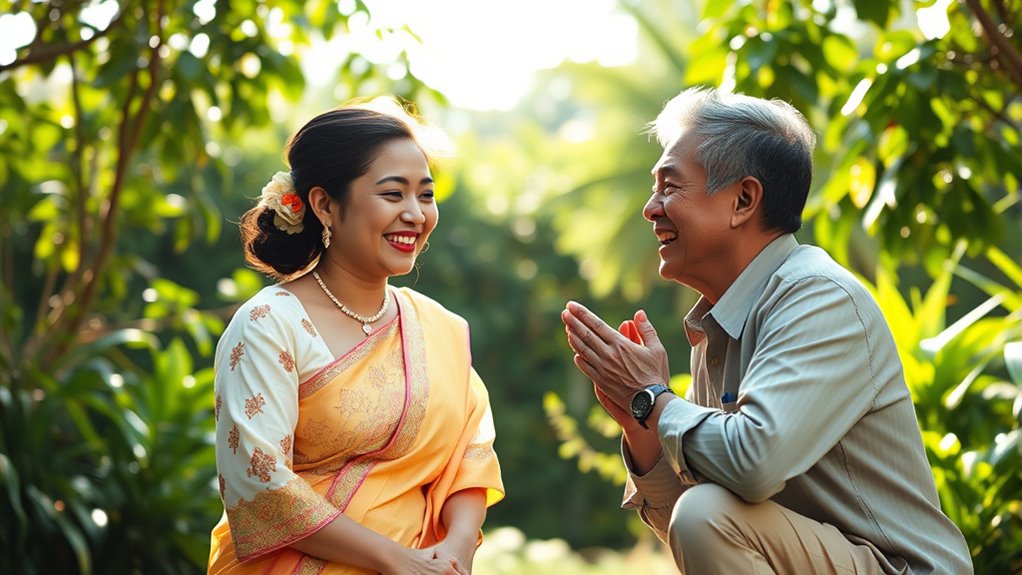
Attractiveness in potential partners often stems from shared values and cultural respect, which leads to the rich tapestry of traditions passed down through elders in Filipino culture.
Attractiveness in partners flourishes through shared values and cultural respect, rooted in Filipino traditions passed down by elders.
You’ll notice that gestures like *pagmamano*, where you take an elder’s hand and place it on your forehead, symbolize deep respect. Using honorific titles like “Lolo” or “Lola” shows your appreciation for their roles.
Elders bless younger generations with phrases like “God Bless You,” reinforcing bonds. Their wisdom is invaluable, guiding family decisions and preserving cultural practices.
In gatherings, elders are central figures, ensuring traditions are celebrated and passed on. This intergenerational connection strengthens family unity and instills a sense of national pride in everyone involved.
The Link Between Respect for Elders and Relationship Success

When you prioritize respect for elders in your relationships, you’re not just honoring tradition; you’re also laying the groundwork for a successful partnership. Respect fosters strong intergenerational bonds, enhancing relationship satisfaction. Studies show that higher levels of respect often lead to greater relationship health and positivity. This respect also encourages effective communication, allowing you to appreciate the wisdom elders provide. Additionally, understanding myths about divorce can help couples navigate challenges together, further strengthening their bond.
In age-gap relationships, showing respect can enhance perceptions of maturity and stability, contributing to trust and commitment. By embracing respect, you create a harmonious environment that nurtures understanding across generations. Additionally, fostering respect can lead to stronger relationship health, which is essential for long-term success.
Ultimately, valuing elders not only enriches your relationship but also connects you to a deeper cultural legacy, paving the way for lasting love and fulfillment.
Frequently Asked Questions
How Can I Show Respect to Elders in Filipino Culture?
To show respect to elders in Filipino culture, you can start by using respectful language like “po” and “opo” when addressing them.
Practice the “mano po” gesture by taking their hand and placing it on your forehead. Always listen to their advice and include them in family decisions.
Spend time with them, engage in conversations, and participate in cultural events that honor their contributions. This fosters a sense of connection and appreciation for their wisdom.
What Are Common Misconceptions About Elder Respect in the Philippines?
Ever wondered why perceptions of elder respect in the Philippines can be misleading?
Not all Filipinos practice traditional gestures like *pagmamano*, particularly in urban areas. Cultural evolution means younger generations often adapt these practices to modern lifestyles.
Additionally, while many elders are respected, some feel stigmatized or view themselves as burdens.
Regional variations also influence how respect is shown, challenging the stereotype of universal reverence for elders in Filipino society.
Are There Specific Rituals for Honoring Elders?
Yes, there are specific rituals for honoring elders in Filipino culture.
One prominent practice is the “mano” gesture, where you take an elder’s hand and press it to your forehead as a sign of respect. You’ll often perform this when greeting them or entering their home.
Additionally, sharing meals and listening to their stories are also meaningful ways to show appreciation and strengthen family bonds with the older generation.
How Does Respect for Elders Vary Across Different Filipino Regions?
In the vibrant tapestry of Filipino culture, respect for elders varies intriguingly across regions. You’ll find that while honorifics and gestures like “mano” are universally practiced, local customs add unique flavors.
In some areas, community festivals celebrate the elderly with traditional dances, while others focus on intimate family gatherings. Despite modernization’s influence, the essence of valuing elder wisdom persists, reminding you that these practices are deeply rooted in the fabric of Filipino life.
What Role Do Elders Play in Filipino Festivals and Celebrations?
Elders play an essential role in Filipino festivals and celebrations. They share stories that connect generations, ensuring cultural traditions thrive.
You’ll notice them leading events, guiding younger participants, and fostering community spirit. Their involvement not only preserves cultural practices but also strengthens social bonds, promoting unity among attendees.
Conclusion
In the grand tapestry of Filipino culture, respecting elders isn’t just a nicety; it’s a superhero cape! When you embrace this value, you’re not just winning hearts; you’re securing a spot in the Hall of Fame for ideal partners. Imagine the admiration you’ll receive, like a rock star on stage, as you honor wisdom and family. So, if you want to sweep a Filipina off her feet, just remember: respect for elders is the ultimate love potion!
